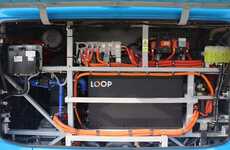
Greg Ponesse — May 18, 2006 — Lifestyle
References: web-japan.org
Competition to develop fuel-cell systems for the home is heating up, and some could be on the market as early as next year. The spread of such systems to generate electricity will help conserve fuel and could slow down environmental destruction. The government is giving full support to these moves and has established a target of meeting 4.5% of all household electricity needs with fuel cells by 2010.
Fuel cells for the home generate electricity and hot water when oxygen reacts chemically with hydrogen that has been extracted from natural gas and other fuels. Such cells for motor vehicles have already been developed, and the first fuel-cell-powered automobiles went on sale late last year.
To make them feasible for home use, though, technical improvements were required to ensure a steady supply of electricity and to make the equipment small enough to be placed around the home. Another big bottleneck was cost. These obstacles have now been cleared to a considerable degree, opening the door to commercialization.
Fuel cells for the home generate electricity and hot water when oxygen reacts chemically with hydrogen that has been extracted from natural gas and other fuels. Such cells for motor vehicles have already been developed, and the first fuel-cell-powered automobiles went on sale late last year.
To make them feasible for home use, though, technical improvements were required to ensure a steady supply of electricity and to make the equipment small enough to be placed around the home. Another big bottleneck was cost. These obstacles have now been cleared to a considerable degree, opening the door to commercialization.
Trend Themes
1. Home Fuel Cells - The development and commercialization of fuel cell systems for home use presents a disruptive innovation opportunity for the energy industry.
2. Clean Energy Generation for Homes - The rise of fuel cells as a viable option for generating electricity and hot water in homes presents a disruptive innovation opportunity for the renewable energy industry.
3. Small Scale Fuel Cell Technology - The development of small, cost-effective fuel cell technology for home use presents a disruptive innovation opportunity for tech companies and manufacturers in the energy industry.
Industry Implications
1. Energy - The widespread adoption of home fuel cells could disrupt the traditional energy industry and reduce dependence on fossil fuels.
2. Renewable Energy - The growing demand for clean energy generation in homes presents a disruptive innovation opportunity for the renewable energy industry.
3. Tech Manufacturing - The development of small and cost-effective fuel cell technology for home use presents a disruptive innovation opportunity for tech manufacturing companies.
3.5
Score
Popularity
Activity
Freshness























